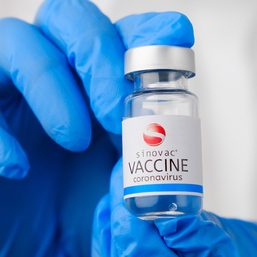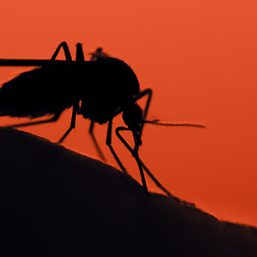SUMMARY
This is AI generated summarization, which may have errors. For context, always refer to the full article.

MANILA, Philippines – The Philippines has been offered 2 million doses of a new vaccine that protects against new and predominant SARS-CoV-2 variants, but the health department is mulling asking for a reduced amount due to low demand for the bivalent vaccine in the country.
Health Secretary Teodoro Herbosa said in an interview with reporters on Monday, September 4, that the offer came from COVAX Facility, the global collaborative effort for equitable access to vaccines.
“May standing offer ang COVAX to actually donate about 2 million doses pero hindi gaanon kabilis ‘yung uptake,” he said.
(COVAX has a standing offer to donate about 2 million doses but uptake is not that fast.)
“We are requesting less [than 2 million doses]. Baka mag-expire, maiksi ang shelf life eh, so we know the rate of how we consume, ‘yung tama lang,” he added.
(The doses might expire because they have a short shelf life. So we know the rate of how we consume, an amount that is just right.)
A recent report Herbosa had received showed that the administering of the 391,000 COVID-19 bivalent vaccines reached 94% only in early September, he said. This means that the donated vaccines were mostly consumed before the stock was set to expire on August 30. But this also means it took more than two months for the stock to be used up.
Herbosa surmises this may be because of the lower sense of urgency about COVID-19, not just in the Philippines, but globally.
“I think, generally, even in the other countries, that’s why we are getting this donation, is because people are not so scared of COVID-19 because the Omicron variants that are later are milder for normal individuals like you and me,” he said.
What is the monovalent XBB vaccine?
The monovalent XBB vaccine was formulated to protect against the XBB.1 lineages of SARS-CoV-2, a new version of the Omicron variant.
The World Health Organization (WHO) has recommended the use of monovalent XBB vaccines. The vaccine regulatory agencies of other countries, including the United States’ Food and Drug Administration, have followed suit. The FDA wants the monovalent XBB vaccines to be administered starting later this year, during the fall season.
XBB.1 lineages are the predominant variants globally, according to the WHO. It said in its latest report that XBB.1.16 is the most prevalent and has been reported in 101 countries since it emerged. XBB.1.5 has been found in 121 countries but is on the decline.
“XBB descendent lineages, including XBB.1.5 and XBB.1.16, are highly immune evasive, with XBB.1.5 being one of the SARS-CoV-2 variants with the greatest magnitude of immune escape from neutralizing antibodies to date,” according to a WHO technical advisory group in this May report.
Access to the COVID-19 bivalent vaccines, which gives protection against both the original strain of virus and the Omicron variant, was opened to the general public in early August due to slow uptake among health workers and senior citizens, the two priority sectors of the population they had been initially reserved for.
In the Philippines and most parts of the world, there has been a decline in COVID-19 cases and deaths reported. President Ferdinand Marcos Jr. lifted the state of public health emergency due to COVID-19 last July. – Rappler.com
Add a comment
How does this make you feel?

![[Rappler’s Best] US does propaganda? Of course.](https://www.rappler.com/tachyon/2024/06/US-does-propaganda-Of-course-june-17-2024.jpg?resize=257%2C257&crop=236px%2C0px%2C720px%2C720px)







There are no comments yet. Add your comment to start the conversation.